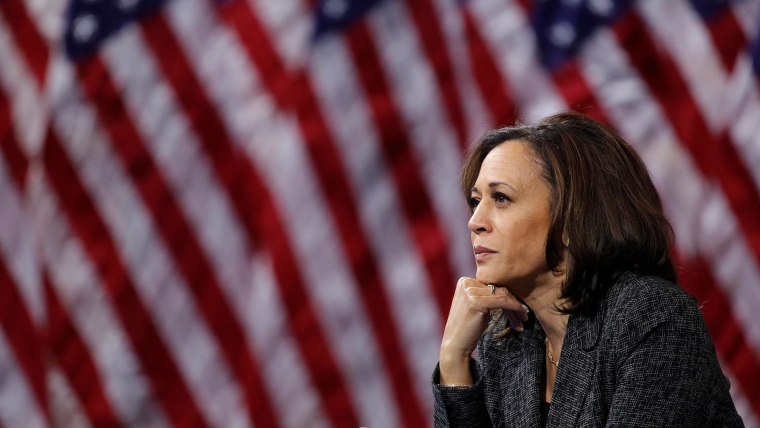WASHINGTON — For decades, Black women have been the backbone of the Democratic Party, the foundational bloc underlying every movement — and yet they have been almost invisible on the main stage, because they seldom move to the forefront.
Former Vice President Joe Biden started to change the nature of that relationship Tuesday by announcing that Kamala Harris, a first-term California senator of Jamaican and Indian descent, will be his running mate as he tries to defeat President Donald Trump in November.
“I don’t know if the vice president will ever know what he did for a group of women who stand in the shadows of America,” the longtime Democratic political operative Minyon Moore said, choking back tears as she spoke in a telephone interview with NBC News moments after the news broke. “He has decided to write us into history. My nieces will see this — and generations to come.”
And yet the choice of Harris, like that of any vice presidential pick, is fundamentally about one thing: winning. Biden didn’t choose her to thank Black women for bailing him out with their votes in the pivotal South Carolina Democratic primary this year, though Black women did that. More important, he will need their votes — and their activism — in swing states in the fall.
Rather than rocket science, that part of his decision is about simple math. Black turnout fell 7.1 percent from 2012 to 2016 across the country, according to the Census data. Trump won Wisconsin, where it is estimated that Black turnout fell by about one-fifth, by fewer than 23,000 votes. There were smaller drops in Florida, North Carolina and other competitive states Trump won where Black voters make up a larger share of the population than Wisconsin and where the race could be close this time.
“Black women are not only the most loyal voters for the Democratic Party — we are key to igniting Black voters across all demographics to show up in record numbers,” hundreds of Black women wrote in an open letter to Biden earlier this year. “There has not been a Democratic presidential nominee in over 40 years that has won the White House without Black women’s leadership and vote — including President Barack Obama, President Bill Clinton, and President Jimmy Carter.”
As much as Biden’s decision is historic, it is more than skin deep. There were a number of Black women in consideration, because he had vowed in March to select a woman. The list included former national security adviser Susan Rice, Reps. Val Demings Florida and Karen Bass of California, and Atlanta Mayor Keisha Lance Bottoms.
For all the firsts that Harris represents — first Black woman, first Asian American woman, first Indian American woman, first Jamaican American woman — she is also emblematic of the most time-honored “first” in vice-presidential selection politics: First, do no harm. More than any of the others, Harris is a known quantity. Though relatively briefly, she has been on the national stage since winning her seat in 2016. She ran for president and was vetted by her primary competitors, including Biden. She’s faced the fawning and hostile sides of the media.
In an email to supporters, Biden nodded to the traits he believes Harris brings to the ticket that reinforce the contrasts he’s trying to draw with Trump. He called her “ready to lead,” praised her for “fighting tooth and nail for what’s right” and said she understands the job carries with it “a duty to care: for you, for all of us.”
As with any candidate, there is the potential downside risk. Harris showed some flaws during her short-lived campaign, which ended before the Iowa caucuses. After hitting Biden over his record on school busing during a 2019 debate, she conceded that she agreed with him on the policy now. The row, which infuriated some people close to Biden, appeared to diminish her standing in the vice presidential sweepstakes, but obviously not enough to block her from the ticket.
“He’s a man who can transcend the pettiness and recognize we can have different views and argue but we’re one family,” said Stacey Plaskett, a Democratic delegate in the House from the Virgin Islands, who initially endorsed Harris in the Democratic primary. Plaskett, a native of New York, said Biden also gave reassurance to many Americans in selecting not only a Black woman but a daughter of immigrants.
“I think that this is a powerful message to those who have really doubted whether America is going in the direction that supports them,” she said, adding “when I found out it was her, I started crying, and I’m not the crying type.”
The Trump response was surprisingly cookie-cutter.
“Phony Kamala” is the nickname his campaign quickly affixed to her in a text message to supporters. Trump tends to call opponents deceptive: “Lyin’ Ted Cruz,” “Lyin’ Hillary” and the like. And the Republican National Committee’s instant response was to say that Biden could have done better for Black people.
“The Biden/Harris ticket is still a bad choice for Black Americans because their radical agenda will raise taxes on Black families and entrepreneurs, make Black communities less safe, and do nothing to empower, champion and uplift Black America like President Trump and Vice President Pence have done,” said Paris Dennard, the RNC’s senior communications adviser for Black Media Affairs.
Moore, who helped organize the group of women who publicly urged Biden to pick a Black woman, said it’s time for them to live up to their end of the bargain.
“What we need to do is put everything we said we would do, what we promised to do for this ticket, we need to do it and get them across the finish line,” she said.












